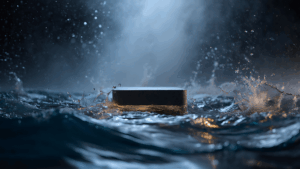Climate change is extremely complex. The Marine Climate Change Impacts Partnership (MCCIP) is an independent source of information and data on marine climate change. MCCIP works closely with scientists to produce authoritative reviews based on scientific evidence.
MCCIP’s findings are not encouraging. Climate change does have an effect on the UK’s coastline, seas and surrounding oceans, and in terms of sea level rises, UK projections show bigger changes than previously predicted. This means we are at increased risk of coastal flooding and erosion.
Sea levels have risen by an average of 12-16cm since 1900, and sea temperatures are rising, possibly by 0.4% per decade. As a result of rising sea levels and more intense storms, we are seeing higher tides and larger waves that are eroding beaches and cliffs. This is also putting man-made infrastructure at risk.
As a result of warmer temperatures, there is a decrease in the concentrations of dissolved oxygen, which is being compounded by increasing acidity. All of these have knock-on effects for aquatic wildlife, for example, cold-water corals are sensitive to water temperature and acidity. It is also predicted that levels of salinity will fall as a result of changes in ocean circulation.
There have already been changes in fish populations, with local declines in cold-water species and greater numbers of warm-water species. Reduced fish stocks as a result of climate change and overexploitation are having an effect on coastal economies. And there has been a 20% reduction in the numbers of sea birds since the 1990s. In addition, marine mammals are having to adapt to habitat loss and increased exposure to algal toxins.
The solutions
Working in partnership with marine conservation organisations and academics, MCCIP has identified a variety of solutions that will help protect marine life and habitats, as well as solutions for the fishing and leisure industries.
At a government level, the Department for Environment, Food & Rural Affairs (Defra) has identified that more than half of the UK’s Marine Protected Areas could contain habitats important for nature-based solutions to climate change. Sandbanks, seaweed and other plant beds all play a role in protecting the coastline from severe weather events. And saltmarshes, seagrasses, salt water reedbeds and muddy habitats support the absorption and storage of carbon dioxide.
Defra’s research will play an important part in protecting the UK coastline, as will the government’s Blue Belt Programme that was launched in 2017. Blue Belt is the government’s flagship international marine conservation programme which works closely with UK Overseas Territories to help them create and maintain healthy and productive marine ecosystems.
The UK has also led the Global Ocean Alliance: 30by30 initiative. This is an alliance of 72 countries that have come together to support a target “to protect at least 30% of the global ocean by 2030, through a network of Marine Protected Areas (MPAs) and Other Effective area-based Conservation Measures (OECMs)”.
In its latest regional statement, the alliance sets out its aim: “As a minimum, the framework should commit all Parties to address the key direct and indirect pressures and drivers of biodiversity loss, including land and sea use change, the unsustainable and illegal use of species, climate change, pollution and invasive alien species through, at least: retaining intact and threatened ecosystems, addressing land- and sea-use change, protecting or conserving at least 30% of the global land and of the ocean, whilst fully respecting the rights of indigenous peoples, as well as local communities, in accordance with national legislation and international instruments as appropriate, restoring degraded ecosystems, reducing pollution from all sources and implementing nature-based solutions in line with the UNEA.5.2 resolution, and implementing the One Health approach.”
The Marine Conservation Society has an online map showing the Marine Protected Areas around the UK. However, it warns that some protected areas are at risk from harmful fishing practices, which destroy habitats and deplete the very stocks on which the fishing industry depends. Action is being taken to help protect our marine biodiversity from the effects of climate change, but there is clearly still work to be done.
What can your business do to help?
At Castle Water, we are committed to helping our customers improve their water sustainability. No matter the size of your business and however limited your budget, there is always something you can do towards saving water.
Download our free Water Efficiency Guide for practical steps you can take now, and keep checking our blogs where we regularly write stories highlighting sustainability and the environment. You can also learn about our services here which include trade effluent expertise, business water services & water efficiency audits. Contact us today.



